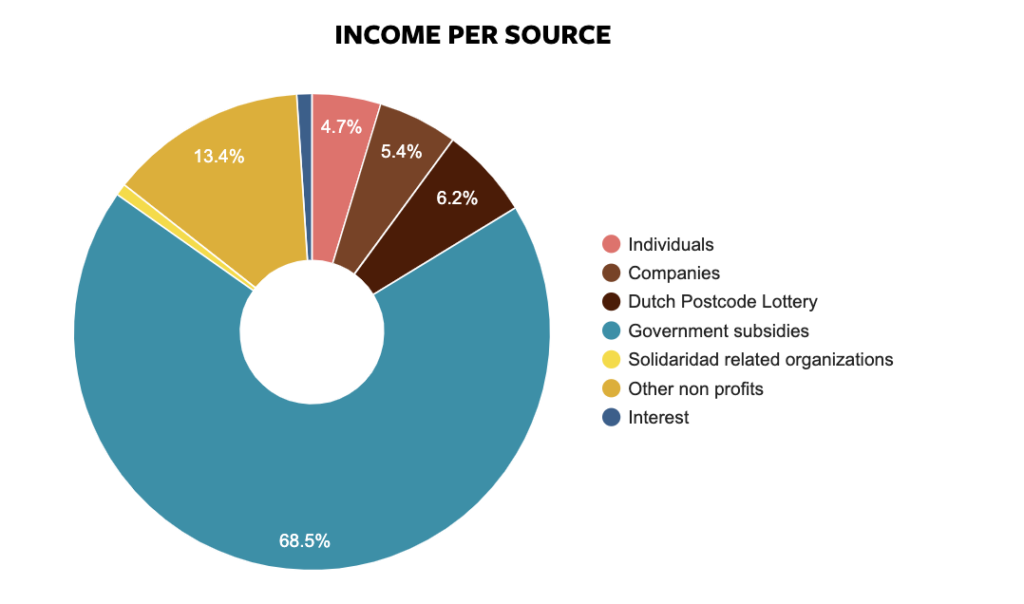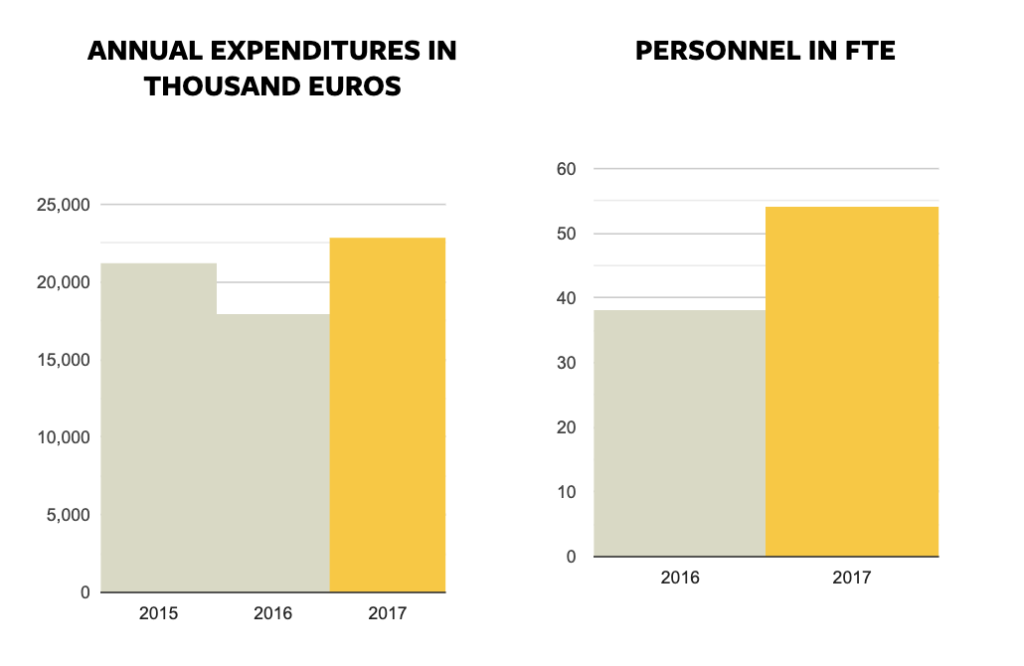DEVELOPMENTS
Strong European economic growth and the strong euro stand out as highlights in a challenging European context. The European Union is under attack and an influx of refugees, as well as heightened tensions with Turkey, Russia and the United States, demand European cooperation and alignment of foreign policies.
In this political climate, Solidaridad’s mission to create more inclusive and sustainable societies is ever relevant. In Germany, Norway, Denmark, the Netherlands and the United Kingdom, Solidaridad experts see that traditional donors are keen to support civil society organizations that work constructively with the private sector. There is continued recognition that to support producers you need comprehensive solutions and these solutions must go beyond certification and training by providing a full suite of approaches. This ranges from ensuring access to finance for creatingh an enabling policy environment, as well as taking a landscape approach to interventions.

ACHIEVEMENTS
The key organizational achievements of Solidaridad Europe in 2017 were steps taken to build a more European organization and the transition to a new organizational structure focussed on the five core activities.
From April 2017 onwards, Solidaridad started this new way of working. This began with the establishment of five core activity teams: Donor Relations, Policy Influencing, Corporate Engagement & Partnerships, Knowledge Management & Learning, and Communications & Campaigning.
By structuring the organization in this way, Solidaridad aims to build even more extensive expertise in these five areas and facilitate stronger learning in and between teams. This will strengthen Solidaridad’s contribution to the global Solidaridad Network and solidify its thought leadership role in the competitive civil society space.
POLICY INFLUENCING
Solidaridad signed the Dutch Gold Sector International Responsible Business Conduct agreement, including an obligation to publicly report on due diligence.Solidaridad outlined the RSPO strategy for smallholders that was then approved by RSPO, and further strengthened the Women In Cocoa & Chocolate Network. As part of the implementation of the Dutch ASGT, Solidaridad lead the development of a living wage roadmap. Presentations in the Financial Pavilion during the Global Landscape Forum resulted in promising leads for impact investment.

Heske Verburg, Managing Director of Solidaridad Europe, signing the gold covenant
CORPORATE ENGAGEMENT & PARTNERSHIPS
Solidaridad Europe maintained supply chain partnerships with 20 companies that supported specific Solidaridad projects. With chemical company BASF, for example, a new project was started in Indonesia focussed on building the capacity of local credit unions to support smallholder palm oil growers produce more sustainably. With chemical company Stahl, a project was started in Ethiopia to improve sustainable practices in leather tanneries and link them to European markets. With the support of the Sustainable Pork Value Chain Association (Keten Duurzaam Varkensvlees), Solidaridad improves the sustainability of smallholder soy production in Mozambique. As a result, the first 223 producers were granted certification from the Round Table on Responsible Soy.
Innovation partnerships were developed with seven companies considered key drivers in creating a more enabling business environment. In cotton and textiles, QuizRR provided digital training tools for factory workers on issues such as labour rights, worker engagement, and wage management. These digital tools helped brands such as the signatories of the Dutch Agreement on Sustainable Garments and Textiles to support capacity development of their suppliers. In addition, Solidaridad provided follow-up support on the ground.
Solidaridad Europe secured two long-term strategic partnerships. Consumer goods companies Henkel and Unilever are leading the development of inclusive and sustainable supply chains. They influence the behaviour of other private sector players, sector initiatives and governments. In 2017, the partnership withHenkel further deepened. An innovative impact investment proposition was developed to start four palm oil rural service centers in Ghana. This will provide inputs and services to smallholder oil palm growers.
In total, Solidaridad Europe managed to secure an income of 1.2m euros from corporate partners in 2017. This puts Solidaridad Europe on track for the multi-annual 2020 target of 3.5m euros, however it was recognized there is a lot more potential for corporate funding and cooperation. Therefore, Solidaridad Europe worked on its partnerships strategy, sharpened its proposition to companies, and planned to invest in better account management of corporate partnerships.
DONOR RELATIONS
The newly formed Donor Relations Team grew and diversified Solidaridad’s donor base. Coordination of fundraising and donor relations improved by defining clear roles and responsibilities regarding account management and opportunity monitoring within the Solidaridad Network. In 2017, Solidaridad Europe was particularly pleased with contracts with new donors such as the Achmea Foundation, G-Star Foundation, World Bank, GIZ and the European Union. In addition, Solidaridad maintained excellent cooperation with its biggest donor, the Dutch Ministry of Foreign Affairs. Solidaridad Europe also managed to raise an amount of 1.1 million euro from private donors and received 1.35 million euro from the Dutch National Postcode Lottery.
KNOWLEDGE MANAGEMENT & LEARNING
In 2017, the Knowledge Management & Learning Team took the lead on three network learning agendas. The team commenced The Corporate Engagement Learning Agenda and facilitated the development of the strategy. As part of the Sustainable Landscape Innovation Learning Agenda, a portfolio analysis was created and key tools were defined to be tested for the landscape approach. As part of the Gender Learning Agenda, the gender policy was finalized, training tools were developed and a portfolio analysis was started.

Sustainable Landscape Taskforce Meeting discussing their Network Learning Agenda
The Knowledge Management & Learning Team developed and facilitated various training courses, provided planning, monitoring and evaluation advice in proposal development and donor reporting. The team also led the process towards a renewal of ISO certification.
COMMUNICATION AND CAMPAIGNING
In addition to successful campaigning work, the Communications & Campaigning Team of Solidaridad Europe improved its online branding. As part of this, the team continually worked on the Dutch website www.solidaridad.nl, contributed to the global website www.solidaridadnetwork.org, and boosted its presence on social media. Significant progress was also made in internal communication and alignment. In addition, a popular summary of the 2020 strategy, an abridged brand manual and an Intranet have been developed. These activities have contributed to more alignment and a stronger and more consistent external presentation.
ORGANIZATION AND HR
At the end of 2017, Solidaridad Europe employed a total of 46 people. This is an increase from 42 in 2016 and 36 in 2015. During the year, there was an average of 40 full-time staff under contract. This is compared to 33.5 in 2016 and 31 in 2015. There were quite a number of significant human resource changes in 2017: Heske Verburg started as the new Managing Director of Solidaridad Europe, three new management team members were welcomed and some senior staff found new positions elsewhere.
Important steps were taken to develop a more people-focussed organization. The SCRUM method, part of the agile movement, was piloted to improve collaboration across teams and the effectiveness of projects. Training was provided in intercultural communication and Solidaridad Europe invested time in personal and team development. Solidaridad showed commitment to further strengthening Solidaridad as a learning organization and developed initial ideas for a Solidaridad Academy.
FINANCE AND CONTROL
In 2017, Solidaridad Europe took major steps towards becoming a truly European organization. The legal entity Solidaridad Europe is now officially in place and the focus of fundraising and policy influencing has expanded to European donors and policy platforms. To build a stronger network of European-based donors and corporate partners, a German operation was started and a representative in the United Kingdom was established. These organizational investments were possible due to the sound financial situation in Solidaridad Europe.
The total income of Solidaridad Europe in 2017 was 23,046,192 euro an increase of 4,466,386 euro compared to 2016. Income from subsidies increased by 2,554,600 euro as compared to 2016. However, this was was 2,007,078 euro less than budgeted and was postponed until 2018. Income from other fundraising sources increased by 1,911,786 euro compared to last year’s result. This was 1,387,270 euro higher than budgeted.
The total expenditure in 2017 was 23,060,227 euro. This is 5,144,678 euro higher than in 2016, but 805,773 euro less than budgeted. This was due to a postponement of income. Of the total expenditure, 22,265,182 euro was directly spent on objectives as stated in the Annual Financial Report 2017. All these fluctuations led to a result of 223,262 euro in the statement of income and expenditure in 2017, where 2016 has a result of 851,684 euro.
For more details on Solidaridad Europe’s accounts, please refer to the Annual Financial Report 2017. The annual accounts have been drawn up in accordance with the Guideline for Fundraising Institutions (Richtlijn Fondsenwervende instellingen: RJ 650), which is part of the accounting standards produced by the Dutch Accounting Standards Board (Raad voor de Jaarverslaggeving).
Solidaridad Europe Financial Report 2017 (PDF)

PARTNERSHIPS
Solidaridad Europe plays an important role in the Solidaridad Network to secure and guide European partnerships by linking them to Solidaridad programming.
- Donors: In 2017, Solidaridad Europe continued to implement and build on its strong partnerships with the Netherlands Ministry of Foreign Affairs and the Netherlands Enterprise Agency (RVO), increasingly shifting from a financial relationship to one of dialogue and learning. Solidaridad Europe made steps to scale engagement with other development partners, focussing on Germany, Denmark, the European Union and a range of foundations. Highlights are the new partnership with the Achmea foundation and new projects in Sri Lanka and Ethiopia that are being implemented with the support of the European Union. Since 2009, Solidaridad Europe has received a yearly contribution from the Dutch National Postcode Lottery. This is a highly valued partnership. The Lottery not only provides a continuous funding base, but they highlight Solidaridad in their communication on TV and in national newspapers.
- Civil society organizations: For Solidaridad Europe’s policy influencing work, partnerships were developed with various civil society organizations in multi-stakeholder initiatives such as the Dutch agreement on sustainable garment and textiles, the Dutch gold sector International Responsible Business Conduct agreement, the Roundtable on Sustainable Palm Oil and the Cocoa Barometer.
- Knowledge institutes: For the Solidaridad Network learning agenda, partnerships are being developed with PBL Netherlands Environmental Assessment Agency, EcoAgriculture Partners, KIT Gender Resource Facility and the Copenhagen Business School. These partnerships will conduct impact research to collect evidence of the effectiveness of Solidaridad’s approaches. Some of these partners have already committed to joint fundraising for research within Solidaridad’s learning agenda.
